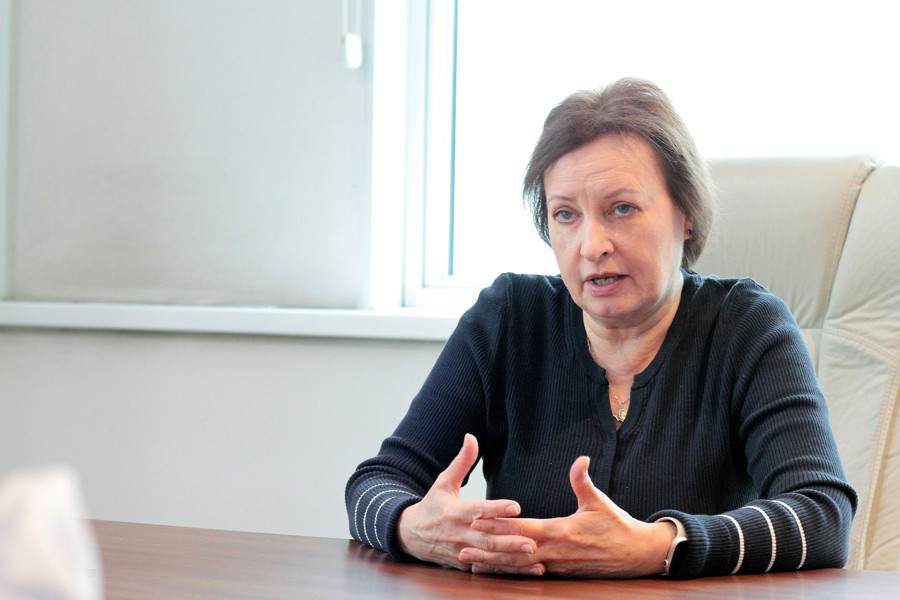Head of USAID Climate Change Program in Kazakhstan Aleksei SANKOVSKI:
THE ABSENCE OF CLEAR RESPONSIBILITY SYSTEM HINDERS KAZAKHSTAN FROM BUILDING AN EFFFICIENT POLICY IN THE FIELD OF LOW CARBON DEVELOPMENT

A quota and greenhouse gas emissions trading system is in effect in Kazakhstan. In addition, the country is a party to the United Nations Framework Convention on Climate Change (UN FCCC). However as experts note serious barriers exist in the country for the successful development of a climate policy. In Aleksei Sankovski’s opinion, head of USAID Climate Change Program in Kazakhstan - a USAID project run by corporation Tampa Tech – the absence of clear cut national goals on reducing greenhouse gas emissions, as well as a transparent system of responsibility for implementing main components of the climate policy hinders Kazakhstan from building up the efficient policy in the field of low carbon development. Aleksei SANKOVSKI told in an interview with Interfax-Kazakhstan about principal amendments to Kazakhstan’s legislation required for making a difference, as well as about what results have been achieved in the last 1.5 years since running the program.
- A program for Kazakhstan to curb climate change - a 3-year United States Agency for International Development (USAID) project – is aimed at supporting Kazakhstan in its endeavor to reduce steadily greenhouse gas emissions in the long-term and boost the energy efficiency of the country’s economy. With what objectives has the program been launched and what has been achieved in the republic?
- The project started in October 2013 and has to end in October 2016. We examined three main objectives in this project. Firstly, this is to help state bodies with the achievement of national goals on low carbon development. This is about stabilizing and cutting greenhouse gas emissions, switching over to renewable energy sources, energy saving and other measures to reduce current and future greenhouse gas emissions with the aim of curbing global climate change. The 2nd objective is to work with the business community; major companies so that they strictly comply with the legislative norms adopted by the government and simultaneously expand their business and develop on the basis of low carbon green technologies. The 3rd objective is to enhance the educational level, awareness in the low carbon development field. There are certain indicators for each goal. This is the number of legislative acts, methods officially adopted by state bodies promoting low carbon development. As for business development this is about the number of companies having a climate change strategy and meeting all the legal requirements. As for the 3rd objective this is about the number of universities and students involved in education in the field of green technologies.
We have recently gone halfway and 1.5 years left to complete the program. We have been more successful in a number of aspects, less in some other aspects, but by and large we assess the project as positive enough. As part of the work with the business community we have conducted a lot of training, in the last 1.5 years there have been nearly 20 training courses in various climate change aspects, involving up to 100 companies and more than 400 attendees. By and large we have improved the level of understanding this problem. We have been working successfully enough with the government and state bodies and provided our comments and recommendations. We have got along very well with educational establishments working with technical universities on developing their lecture potential in Karaganda, Pavlodar, Ust-Kamenogorsk, Astana and Almaty. We established 3 industrial energy audit centers, where teachers, students and qualified auditors can work together with small and medium-sized businesses and help them implement energy efficient technologies.
Off course, there are certain problems. In particular, they are related to the fact that the problem of low carbon development regularly arises within state bodies and the level of its priority changes from time to time. And this in combination with reshuffles within the ministries causes certain complications. New people come, it’s necessary to explain everything to them again. Here we are powerless to change anything but we try to continue with work in this aspect.
- It turns out that the main problem is to establish interaction with the authorities, isn’t?
- I would not say that this is a less successful aspect compared with others but it this its own specifics. Currently it is high time to make amendments to the laws for improving the legislation and in particular the Environmental Code. This would make it possible to control efficiently greenhouse gas emissions at those enterprises which fall under the emission restrictions and trading system. Plenty of legislative acts have been passed in Kazakhstan, there are the Environmental Code, government decrees, ministerial orders but there is no single and clear target, which these documents must be aimed at. Some aspects are not workable de jure as a matter of fact. For a long time recommendations have been provided in order to bring the legislation into conformity with the international standards , European and U.S. – with those norms which are already working, however so far the process has not resulted in anything. Endless conferences are under way. The proposed amendments, perhaps, are not ideal but they are better than what is available. Now both companies and regulators are experiencing difficulties. Everybody already understood that something has to be done but for the time being there are no changes and this is a big problem.
- What principal amendments to the legislation are needed to make a difference?
- First of all, this is a creation of a national body and a mechanism, maybe, even a mechanism rather than a new administrative unit in order to administer and manage the existing national system of greenhouse gas emission restrictions and permit trading. The law reads that there is a national plan, there are 166 enterprises, which got these quotas but there is not a centralized mechanism, centralized body or system of state bodies to control and manage different parts of this system. The climate change department is limited to its abilities; it is involved in lawmaking, international affairs but cannot control the system of restrictions and quota trading. There is the ecological regulation and supervision committee, which supervises implementation but within its limits. Organization Zhasyl Damy (Green Development) used to have a contract with the ministry with regard to administering this program. Now everything is in limbo, there is no new long-term contract aimed at administering the system. Someone trades in quotas on the stock exchange but a controls system leaves something to be desired. Nobody knows on which basis additional quotas are granted, the mechanism of their provision is not transparent.
On our part, we can outline this problem and give recommendations. The 1st thing to be done is to set up an understandable mechanism. Secondly, to adopt national priorities, goals, a national strategy on the climate change subject. Yes, there is the green economy concept, there are the energy saving law, law on renewable energy sources. But all these aspects are apart from each other. There is no unified strategy pointing to those who is in charge, no [clauses on] financing are set out. Without that all the amendments to be made would hang in the air because it is not clear what to target. The 3rd problem is a quite low level of awareness on this subject among the decisions-making officials and those who execute these decisions, among the general public and business community. All this, certainly, impedes the drafting of strategy and mechanism .
- You suggested Kazakhstan adopts a national plan on greenhouse gas emission quota by this September, what did such a fixed deadline arise from?
- Firstly, there is an available legislative base highlighting that emissions are regulated through the national quota distribution plan. There is no yet such a plan for 2016 - it should be passed by the end of this year and so it needs to be drafted, discussed with enterprises and approved. The 2nd subject is the international one. There will be a conference in late November in Paris to address new commitments on emission cuts as part of the UN Climate Change Convention. An intergovernmental agreement about curbing greenhouse gas emissions should be signed, which would include almost all of the counties. Currently countries have to submit their proposals on their emissions. For now only the US, European countries, Russia and some other states have provided this data. They submitted their applications by how much they can reduce emissions in the long-term. Kazakhstan has to submit its application by October and in order to do so it is necessary to evaluate its capabilities, the current situation.
- As for the understanding of the situation on the part of companies, are all of them happy to revise their emissions, and for example, to draft a climate strategy?
- Climate strategy regarding enterprises is called climate change action plan. We can only recommend those enterprises, which are included in the quota trading system that they work out such action plan but the legislation does not require it. We are currently working with a number of large enterprises, industrial groups, which understand that this needs to be done. The process is under way. Ideally all the enterprises such have such plans. The system currently includes 166 enterprises. Some of them feature one facility but others - groups of facilities. For example it makes no sense to have a climate strategy for one power station but if 20-30 businesses, running several facilities, had climate change action plans this would be a good indicator . However for the time being only 2-3 companies are interested in that. And again uncertainty in the legislation affects this.
- Thank you for the interview!
June, 2015
© 2026 Interfax-Kazakhstan news agency
Copying and use of these materials without reference to the source is prohibited
Archive





